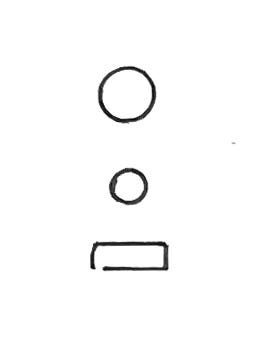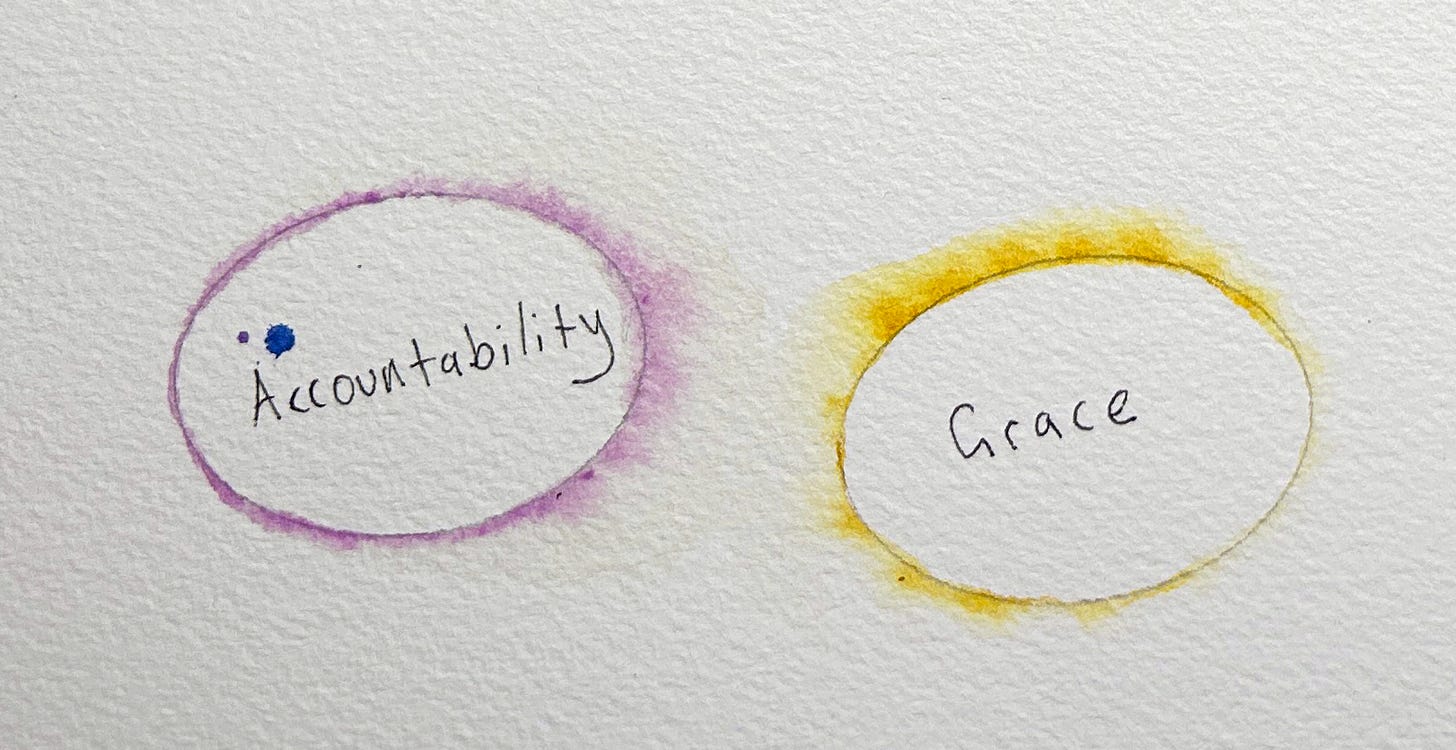We Need To Talk About Accountability
Can we actually hold someone accountable? What does it really mean to be accountable?
Welcome to Conflict Confidential, a newsletter about conflict, relationships, and being a person.
These next three newsletters are on accountability. This is Part 1. Read Part 2 here.
We all have people in our lives who are incapable of apologizing. It’s agonizing to be angry with someone who refuses to admit they’ve even done anything wrong. People really close to us, who love us, we know they do, will do everything to deflect our expressions of hurt in order to protect their own sense of self. It creates a relational stalemate.
Still I find myself hopeful the other might just need to see where I’m coming from. Maybe if they just understood they could at least acknowledge they did something that hurt me.
Again and again I splatter against a wall of disappointment. Can not permeate. I will not be acknowledged in the way my soul desires.
It’s not even an apology I want, if I’m being honest. I want my feelings to be validated. I want to feel heard, and understood. I want to ask questions and receive honest answers. I also want an action-plan. I want a shared understanding of what was done and how it will be remedied going forward.
What I want is accountability.
I’ve always wanted this. I remember having a serious conflict with an older family member about 15 years ago. They had sent me a really unkind text which could not have been interpreted in any other way other than written to cause me pain. I remember waking up from a nap, reading it, and feeling my heart lurch into my throat. I felt like crying. My body shook with hurt, and rage. I was not going to stand for it. A text! YOU’RE GONNA SEND ME A FUCKED UP TEXT AND THINK THAT’LL BE THE END OF IT!? I called them.
After some days of phone tag we finally spoke. I remember asking them why. Why would they text me like that? What did I do to deserve it?
A few things happened on the call. After some prodding, it was clear their issue with me mostly had to do with their reaction to other people in my family. Something upsetting was said to them apparently, unbeknownst to me. (Family drama, we all got it.) I also learned they were ready to say whatever they thought I wanted to hear just to get off the phone. They did not want to explain why they sent the rude text. They did not want to engage in the tormenting thought-exercises I tried to put them through (“How would you feel if it was your kid on the receiving end of that kind of text...?”) They struggled, it seemed, to even understand their own motivations for why they did what they did. “I’m sorry,” they said early and quickly, probably hoping it would end the conversation. It didn’t. I was hurt and confused. Despite hearing “sorry” I still wanted my questions answered. Eventually we ended the call fine, I guess. But our relationship never really bounced back. I’m not still harboring hard feelings. I have compassion for the both of us especially back then (our family hasn’t always been the easiest to exist within.) But the call stands out in my memory because of how empty “sorry” felt.
As kids we are trained to say sorry. As if uttering the word sorry is the magic fix. Many of us parents often urge our kids to say sorry to each other. But they don’t want to. And they don’t mean it just by repeating it. Sorry is hollow unless it’s filled with honest reflection and intention.
Danielle Sered has coined the idea of “doing sorry” in her powerful book Until We Reckon:
“Accountability is not just about being or feeling sorry— it is about a set of actions that demonstrate remorse in practice. And it is not the feeling of remorse that delivers us from our shame1— it is the practice of accountability in action. It is doing sorry.”
What does doing sorry look like? What does it mean to be accountable in action, and to whom? Who ensures accountability happens?
We often think about others stepping in, authority figures or people taking a moral high ground, to “hold” someone accountable. We think we hold other people accountable when we call them out, or “cancel” them.2 But is that effective? Does exerting a sort of pressure on someone make them more accountable? Sure it might encourage someone to engage in deep self-reflection. It might allow accusers or victims to experience some vindication which can feel good. But true accountability requires something more complex than just confrontation and banishment.
Miriame Kaba provides a compelling argument for a more realistic version of accountability. Here’s what she said in the recent final episode of the podcast One Million Experiments:
“You cannot hold other people accountable without their consent to doing it.
No one is going to be held accountable by some external force if they don’t agree they did anything wrong.
You can punish people.3 That’s passive.
But you cannot claim that you’re holding any strangers accountable for anything. Why should they agree to be held accountable from somebody they have zero relationship with and don’t care about?
There isn’t just one side to anything, there are multiple sides to everything.
[We have to] get on the same page to agree there was an issue that occurred and that we have a similar understanding of what that issue was. That’s the basis through which we can actually then “hold people accountable.” Because we’re in relationship with them, they’ve decided that they did something wrong to actually be held into account for and take responsibility for.
And no matter what people want, which is a desperate need to control other people, we don’t control other people. We simply don’t. We can barely control ourselves.”
Accountability is multifaceted. It’s complex. It’s also commonly misunderstood, which is why it often feels so hard to access.
Sered writes that accountability requires five key elements:
acknowledging one’s responsibility for one’s actions;
acknowledging the impact of one’s actions on others;
expressing genuine remorse;
taking actions to repair the harm to the degree possible; and
no longer committing similar harm.
Accountability is a reckoning with conflict through the form of relationship. It is not something to impose, it can’t be put on like a coat of paint. Between people, accountability is an exchange of a shared understanding with intentions and actions toward a corrective path forward. With ourselves, accountability requires honesty.
Accountability cannot be coerced. Reluctance hinders personal responsibility. The fulcrum of accountability is where people want to go, not what we pressure them to do.
Accountability requires vulnerability. There’s a softening when we’re not simply seeking revenge, or being on guard to avoid punishment. We have to connect with our sense of dignity and recognize our human imperfectness as we work through the complex process of repairing harm.
“Dancing between accountability and grace is an art form,” writes Dr. Shawn Ginwright in his book The Four Pivots: Reimagining Justice, Reimagining Ourselves. “Without grace, accountability becomes social confinement, and without accountability, grace can become sentimental surrender. We need to joyfully dance between both, and when this happens, we collectively humanize one another and create new ways of being together... It’s not an easy dance, but it’s a worthy one.”
If we understand what accountability actually means, then maybe we can actually start to “hold” others, and ourselves, accountable. Gracefully, of course.
“We use shaming as our primary emotional tool. But shame impedes change. It just does.” Prentis Hemphill, What It Takes To Heal
“Sometimes we wrap our tender fears and judgments and in blame, punishing someone for making us bare our chests… We try to make people feel the pain we felt. But we know somewhere within us that vengeance makes us insatiable. Another’s pain can never relieve our own.” Prentis Hemphill, What It Takes To Heal
More on punishment in the next newsletter.






